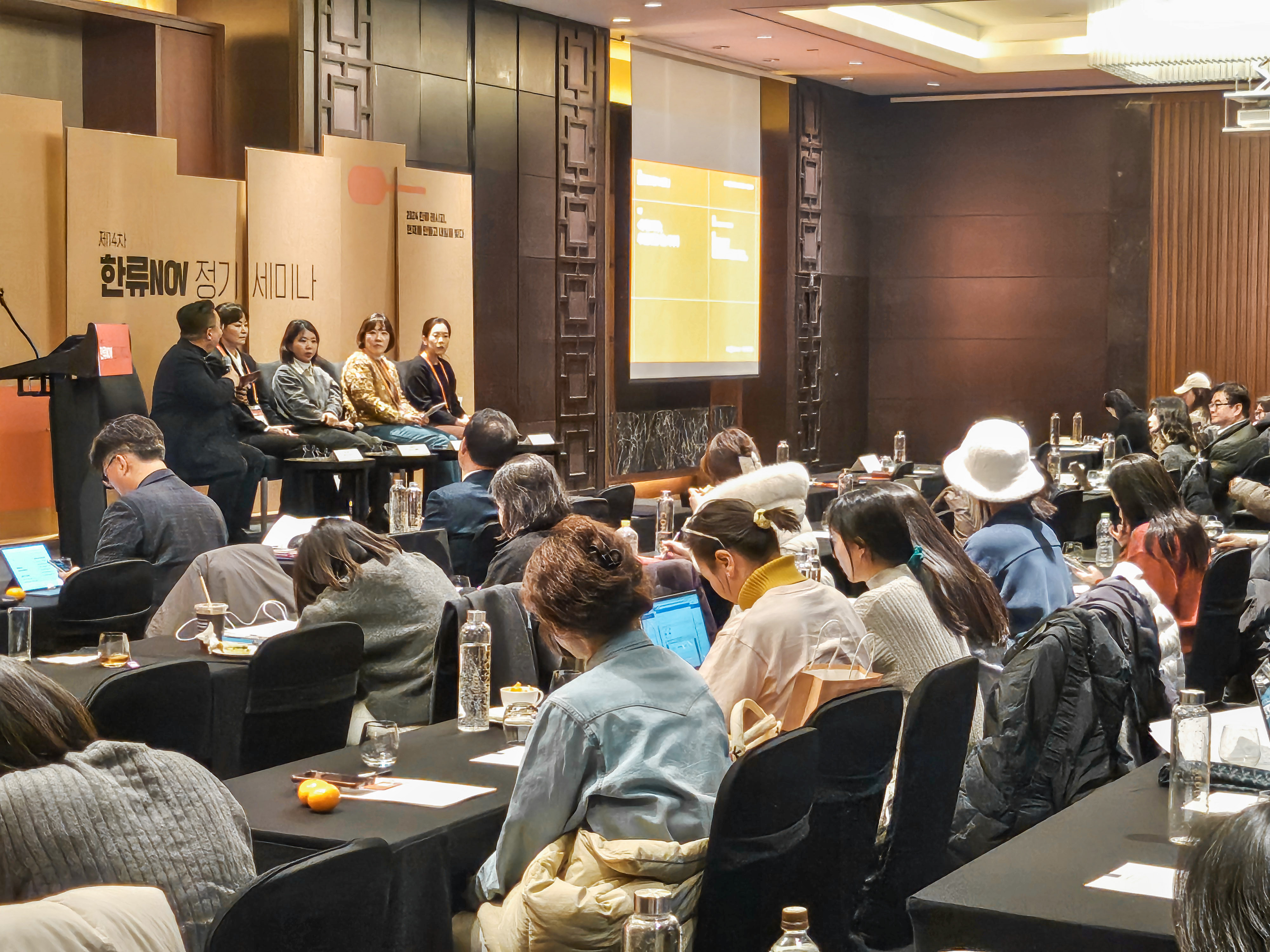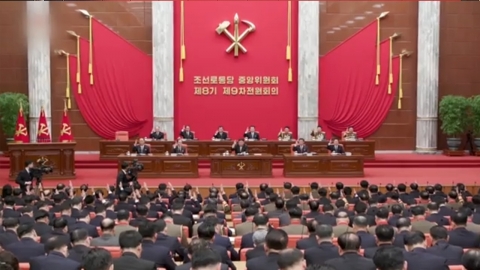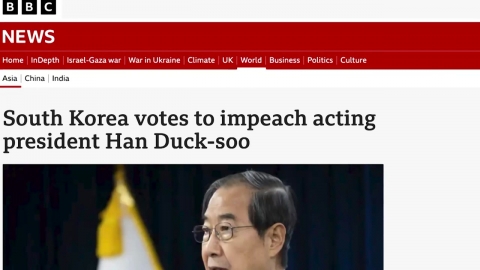"What's the secret of a black and white chef's success?" KOFICE, the 14th Hallyu NOW regular seminar.
이미지 확대 보기

The Korea International Cultural Exchange Promotion Agency (KOFICE) announced on the 18th that it successfully ended the 14th Hallyu NOW regular seminar at the Conrad Hotel in Yeouido.
Under the theme of "Hallyu Recipe: Making the Present and Making the Tomorrow," the seminar comprehensively examined global Hallyu data and overseas acceptance of Hallyu through three sessions and discussed the actual direction of Hallyu's development.
The first session was hosted by Cho Young-shin, head of SK Broadband's management strategy group, under the theme of "OTT and Hallyu Big Data: How to Discover Global Hallyu Data?" Kim Ki-joo, managing director of Hankook Research, who was the first presenter, pointed out the "data imbalance" problem caused by the global OTT platform monopolizing data. Global consumption of Korean content is increasing, but there is no data-based strategy, he said, arguing that a customized strategy should be established by integrating local platforms and various contents such as music, sports, and webtoons. Kim Han-Mil, director of Arspraxia, pointed out the limitations of the numerical-centered approach and suggested the possibility of using "humanistic big data analysis" and AI technology reflecting the local cultural and social context.
In the first part of the discussion, Kang Hye-won, a professor at Sungkyunkwan University, emphasized that the Korean Wave is not a simple economic tool but a phenomenon with a multidimensional meaning. Kwak Young-ho, CEO of Hanteo Global, pointed out that when analyzing the characteristics of K-pop fandom, it is possible to understand the characteristics of fandom more closely when segmented target data are prepared rather than integrated data.
The second session, hosted by Kyungnam University Professor Jang Min-ji, was "Overseas Korean Wave Acceptance and Diagnosis and Film "Pillow". Lee Hyun-ji, a senior researcher at KOFICE, announced the results of a 2024 overseas Korean Wave survey of 26,400 people from 28 countries, and the spread of OTT platforms has increased the global recognition of Korean movies and dramas, but some countries are concerned that political and social factors could lead to negative perceptions of Korean Wave content. Kim Ah-young, head of KOFICE's research team, said through an Indonesian Korean Wave acceptance study, the drama confirmed the continued strength of romantic comedies after "Boys Over Flowers" and the continued popularity of SM Entertainment artists such as Super Junior. In the entertainment industry, it was analyzed that longevity programs such as "Running Man" and movies were combined with local preferred shamanism and occult genres, and "The Seedlings" received a great response.
Producer Kim Young-min, producer of the film "Pillow", explained that the supernatural material and original story led to the sympathy of Southeast Asian audiences, saying that he aimed to immerse himself in the audience without Hallyu in mind at the planning stage. In the discussion that followed, Park So-jung, a professor at Hanyang University, pointed out that it was a religious power to bring together diversity in Southeast Asia, especially Indonesia, where the Korean Wave developed relatively slowly, but it became important to track the backlash against the Korean Wave, pointing out that it is the Korean Wave that conflicts with religion. Professor Boo Kyung-hwan of Seoul National University said, "The linguistic barrier of Hallyu content, which was revealed through an overseas Hallyu survey, is an example of Hallyu spreading to the public beyond enthusiasts," stressing that mutual cultural exchange is important, not unilateral entry.
!["What's the secret of a black and white chef's success?" KOFICE, the 14th Hallyu NOW regular seminar.]()
Under the theme of "Hallyu Recipe: Making the Present and Making the Tomorrow," the seminar comprehensively examined global Hallyu data and overseas acceptance of Hallyu through three sessions and discussed the actual direction of Hallyu's development.
The first session was hosted by Cho Young-shin, head of SK Broadband's management strategy group, under the theme of "OTT and Hallyu Big Data: How to Discover Global Hallyu Data?" Kim Ki-joo, managing director of Hankook Research, who was the first presenter, pointed out the "data imbalance" problem caused by the global OTT platform monopolizing data. Global consumption of Korean content is increasing, but there is no data-based strategy, he said, arguing that a customized strategy should be established by integrating local platforms and various contents such as music, sports, and webtoons. Kim Han-Mil, director of Arspraxia, pointed out the limitations of the numerical-centered approach and suggested the possibility of using "humanistic big data analysis" and AI technology reflecting the local cultural and social context.
In the first part of the discussion, Kang Hye-won, a professor at Sungkyunkwan University, emphasized that the Korean Wave is not a simple economic tool but a phenomenon with a multidimensional meaning. Kwak Young-ho, CEO of Hanteo Global, pointed out that when analyzing the characteristics of K-pop fandom, it is possible to understand the characteristics of fandom more closely when segmented target data are prepared rather than integrated data.
The second session, hosted by Kyungnam University Professor Jang Min-ji, was "Overseas Korean Wave Acceptance and Diagnosis and Film "Pillow". Lee Hyun-ji, a senior researcher at KOFICE, announced the results of a 2024 overseas Korean Wave survey of 26,400 people from 28 countries, and the spread of OTT platforms has increased the global recognition of Korean movies and dramas, but some countries are concerned that political and social factors could lead to negative perceptions of Korean Wave content. Kim Ah-young, head of KOFICE's research team, said through an Indonesian Korean Wave acceptance study, the drama confirmed the continued strength of romantic comedies after "Boys Over Flowers" and the continued popularity of SM Entertainment artists such as Super Junior. In the entertainment industry, it was analyzed that longevity programs such as "Running Man" and movies were combined with local preferred shamanism and occult genres, and "The Seedlings" received a great response.
Producer Kim Young-min, producer of the film "Pillow", explained that the supernatural material and original story led to the sympathy of Southeast Asian audiences, saying that he aimed to immerse himself in the audience without Hallyu in mind at the planning stage. In the discussion that followed, Park So-jung, a professor at Hanyang University, pointed out that it was a religious power to bring together diversity in Southeast Asia, especially Indonesia, where the Korean Wave developed relatively slowly, but it became important to track the backlash against the Korean Wave, pointing out that it is the Korean Wave that conflicts with religion. Professor Boo Kyung-hwan of Seoul National University said, "The linguistic barrier of Hallyu content, which was revealed through an overseas Hallyu survey, is an example of Hallyu spreading to the public beyond enthusiasts," stressing that mutual cultural exchange is important, not unilateral entry.
이미지 확대 보기

In the third session, the success factors of the leading entertainment program "Black and White Cook" in 2024 were discussed. Chef Cho Eun-joo took charge of the first presentation under the society of Seoul National University professor Moon Jung-hoon, explaining that cooking served as a medium to convey Korean emotions. Kim Eun-ji, producer of Studio Slam, said, "We prioritized the satisfaction of domestic viewers in the program planning stage," adding, "The unexpected global success is the result of satisfying the demands of Korean viewers."
Kang Bo-ra, a researcher at Yonsei University, cited the highlight of Korean characteristics in digital content as a factor for the success of "Black and White Cook." Character storytelling and the use of short-form content contributed to the global spread. Park Kyung-jin, former KOFICE Beijing correspondent, said that in China, the program's "black" and "white" settings were positively accepted in connection with the locally familiar Go image, but the reaction was as great as the program's global popularity.
Park Chang-sik, president of the Korea International Cultural Exchange Promotion Agency, said, "This seminar has led to practical and meaningful discussions on the production and acceptance of Korean Wave contents and the use of data. We will continue to cooperate with related ministries to increase the effectiveness of the Korean Wave policy."
The seminar video will be released on the agency's YouTube channel and the Korean Wave Research Archive in January next year.
Kang Bo-ra, a researcher at Yonsei University, cited the highlight of Korean characteristics in digital content as a factor for the success of "Black and White Cook." Character storytelling and the use of short-form content contributed to the global spread. Park Kyung-jin, former KOFICE Beijing correspondent, said that in China, the program's "black" and "white" settings were positively accepted in connection with the locally familiar Go image, but the reaction was as great as the program's global popularity.
Park Chang-sik, president of the Korea International Cultural Exchange Promotion Agency, said, "This seminar has led to practical and meaningful discussions on the production and acceptance of Korean Wave contents and the use of data. We will continue to cooperate with related ministries to increase the effectiveness of the Korean Wave policy."
The seminar video will be released on the agency's YouTube channel and the Korean Wave Research Archive in January next year.
[Copyright holder (c) YTN Unauthorized reproduction, redistribution and use of AI data prohibited]
Editor's Recomended News
The Lastest News
-
재생
![[Weather] A lot of snow until noon in Chungcheong and Honam...Up to 10cm. It's very cold.](https://image.ytn.co.kr/general/jpg/2024/1228/202412280557274610_h.jpg) [Weather] A lot of snow until noon in Chungcheong and Honam...Up to 10cm. It's very cold.
[Weather] A lot of snow until noon in Chungcheong and Honam...Up to 10cm. It's very cold. -
 770,000 homeless people in the United States...It's an all-time high, up 18% in a year.
770,000 homeless people in the United States...It's an all-time high, up 18% in a year. -
'Harris Big Sponsor' Bill Gates Also Calls for Trump Meeting
-
Russian Aviation Administration "Ukra Drone Attack on Accident Day""Closing the airspace"









